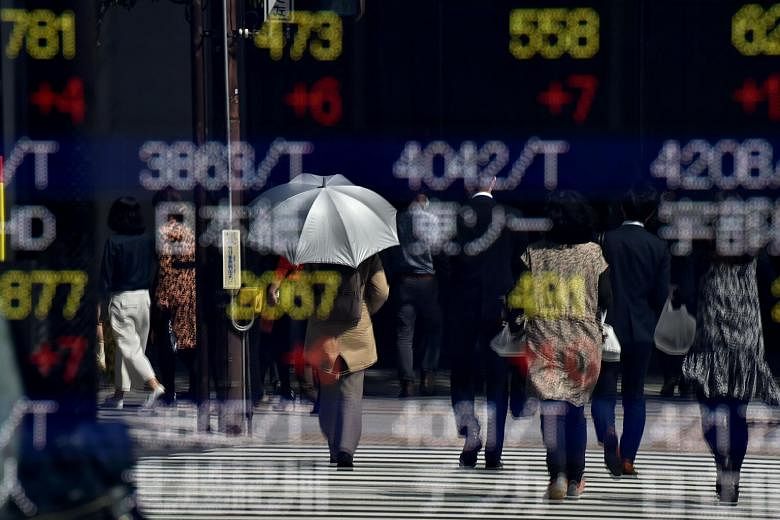WELLINGTON/SINGAPORE (BLOOMBERG) - Japan drove gains in Asian equities with the yen weakening against the US dollar for a third day after two Federal Reserve officials suggested the US central bank may raise interest rates as soon as next month.
The prospect of a US interest-rate hike as soon as April also drove the greenback up against the Singapore dollar and the Malaysian ringgit.
The presidents of the San Francisco and Atlanta Feds said on Monday that tighter borrowing conditions could be warranted as soon as the bank's April 26-27 meeting.
"There is sufficient momentum evidenced by the economic data to justify a further step at one of the coming meetings, possibly as early as the meeting scheduled for end of April," Fed Bank of Atlanta President Dennis Lockhart said on Monday. Mr Lockhart is a policy-centrist and doesn't vote on the Fed Open Market Committee this year. His moderately upbeat assessment of the US economy was shared by San Francisco Fed chief John Williams.
The MSCI Asia Pacific Index climbed 0.7 per cent as of 9:38 am Tokyo time as the Topix jumped 2.2 per cent, set for its steepest one-day gain since March 2. The yen, which typically moves at odds with Japanese shares, slipped a third day, losing 0.1 per cent to 112.11 per dollar.
Australia's S&P/ASX 200 Index swung between gains and losses. Elmer Funke Kupper, chief executive officer of Australian bourse operator ASX, stepped down Monday amid an investigation into the betting company he formerly led. ASX shares fell 0.4 per cent in a second day of declines.
The Kospi index in Seoul increased 0.1 per cent whle Singapore's Straits Times Index was up 0.55 per cent at 2,896.60 as of 9: 32 am.
Singapore's dollar lost 0.2 per cent against the US dollar and the ringgit weakened 0.1 per cent.
A recovery in crude oil prices and the willingness of central banks to support global growth has calmed markets following a volatile first six weeks of 2016, which saw US equities post the worst start to a year on record. While price swings have eased and crude is trading more than 50 per cent above this year's low, investor confidence remains fragile with concern over China's economic slowdown and the global oil supply glut lingering.
Futures on the Dow Jones Industrial Average climbed 0.1 per cent early Tuesday, after the blue-chip equity gauge rose a seventh day, adding 0.1 per cent last session to cap its longest run of gains since October. E-mini contracts on the Standard & Poor's 500 Index were also up 0.1 per cent, following the benchmark's 0.1 per cent climb to 2,051.60.
In Hong Kong, contracts on the Hang Seng and Hang Seng China Enterprises indexes gained at least 0.5 per cent in most recent trading. The Chinese benchmark rose 2.2 per cent on Monday, posting its longest rally since May and closing at its highest level since Jan 12 after officials eased curbs surrounding margin trading.
With the yen retreating, the Bloomberg Dollar Spot Index looked set for a third rising day, adding 0.1 per cent following a 0.3 per cent climb last session. The gauge, which tracks the greenback against 10 major peers, slid 1.3 per cent last week after the Fed dialed back its outlook for interest-rate hikes this year, citing concerns over the global economy.
Australia's dollar also headed for a third day of losses, with RBA Governor Glenn Stevens to speak at a forum in Sydney Tuesday. The central bank's jawboning of the currency, or attempts to talk is weaker, have attracted criticism from the US Treasury, with the body's representative to the International Monetary Fund expressing concern over officials' attempts to influence the exchange rate through their "public statements."

